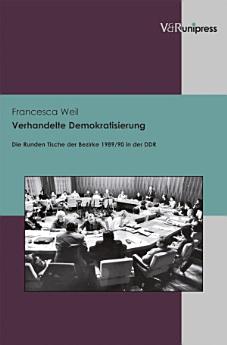Verhandelte Demokratisierung: Die Runden Tische der Bezirke 1989/90 in der DDR
มิ.ย. 2011 · V&R Unipress
eBook
248
หน้า
family_home
มีสิทธิ์
info
reportคะแนนและรีวิวไม่ได้รับการตรวจสอบยืนยัน ดูข้อมูลเพิ่มเติม
เกี่ยวกับ eBook เล่มนี้
Up until now, the multifacetted forms of involvement in the round table talks held at district level in East Germany in 1989/90 have been overshadowed by the achievements of the Central Round Table talks in Berlin. The true significance of the district round table talks has been underestimated, however. This study looks at the role and function of the 15 district round table talks held during the East German transition process, and their specific contribution to democratisation at regional level. Their tasks and working methods, but especially their direct influence and capabilities were extremely varied. This alone testifies to the diverse nature of the processes that took place during the few months of "bottom-up democratisation", which, if nothing else, is also an expression of an independent democratisation of the GDR, shaped by civil society activities.
เกี่ยวกับผู้แต่ง
Dr. phil. Francesca Weil war bis 2002 als wissenschaftliche Mitarbeiterin am Historischen Seminar der Universität Leipzig beschäftigt. Seit 2003 arbeitet sie am Hannah-Arendt- Institut für Totalitarismusforschung e.V. an der Technischen Universität Dresden. Sie leitet das Forschungsfeld »Nationalsozialismus«.
ให้คะแนน eBook นี้
แสดงความเห็นของคุณให้เรารับรู้
ข้อมูลในการอ่าน
สมาร์ทโฟนและแท็บเล็ต
ติดตั้งแอป Google Play Books สำหรับ Android และ iPad/iPhone แอปจะซิงค์โดยอัตโนมัติกับบัญชีของคุณ และช่วยให้คุณอ่านแบบออนไลน์หรือออฟไลน์ได้ทุกที่
แล็ปท็อปและคอมพิวเตอร์
คุณฟังหนังสือเสียงที่ซื้อจาก Google Play โดยใช้เว็บเบราว์เซอร์ในคอมพิวเตอร์ได้
eReader และอุปกรณ์อื่นๆ
หากต้องการอ่านบนอุปกรณ์ e-ink เช่น Kobo eReader คุณจะต้องดาวน์โหลดและโอนไฟล์ไปยังอุปกรณ์ของคุณ โปรดทำตามวิธีการอย่างละเอียดในศูนย์ช่วยเหลือเพื่อโอนไฟล์ไปยัง eReader ที่รองรับ





